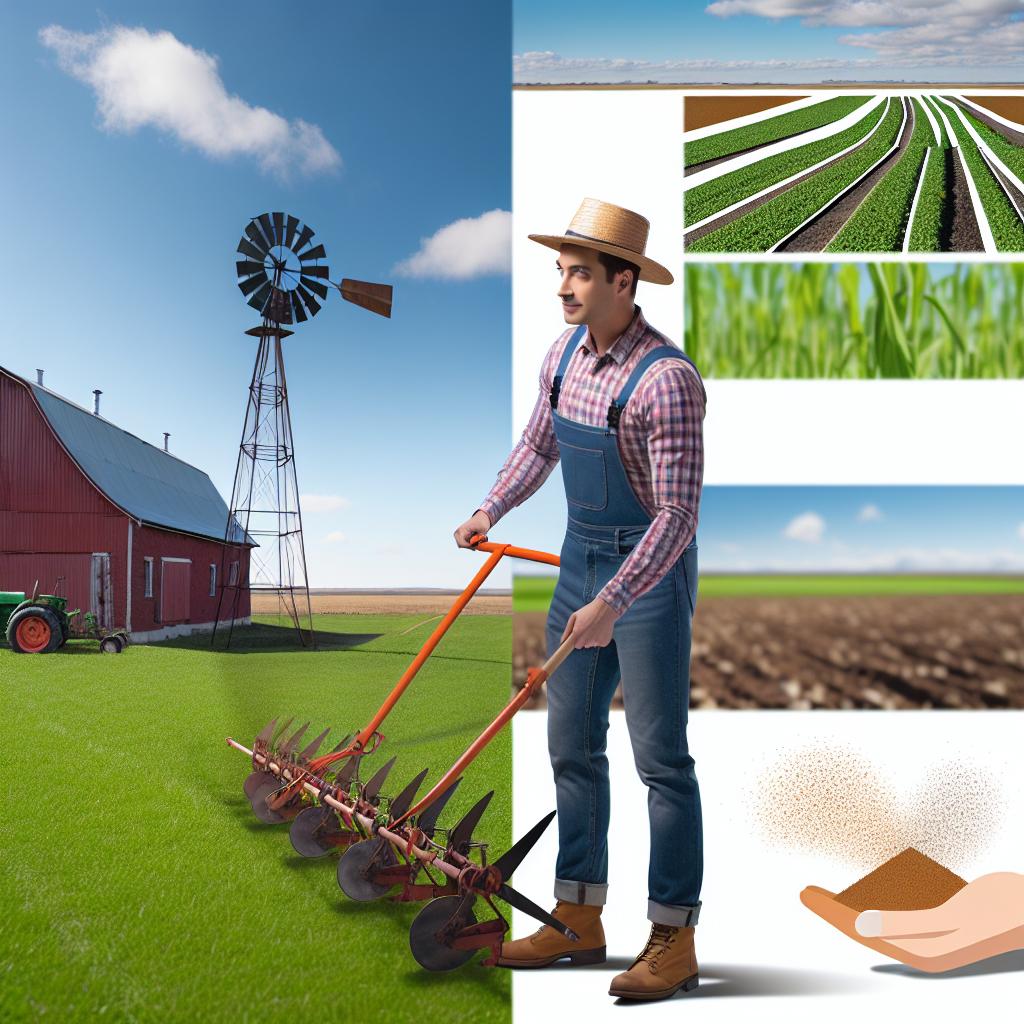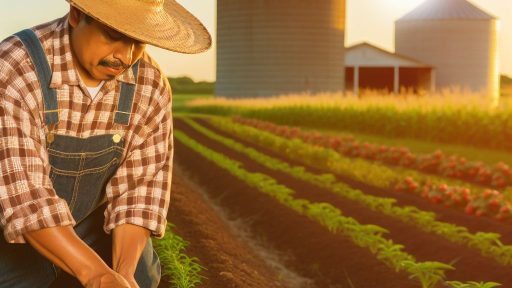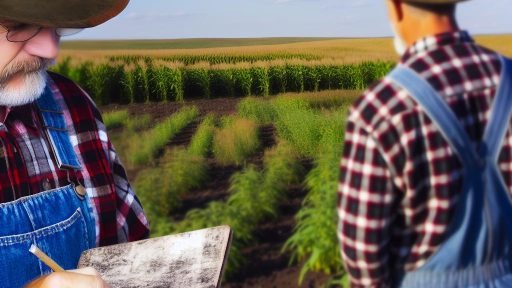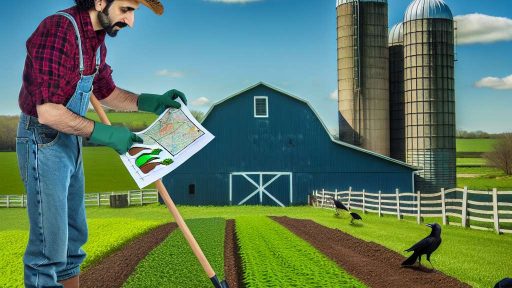Introduction to Smart Farming
Definition of Smart Farming
Smart farming refers to the integration of technology in agriculture.
This approach enhances the productivity and efficiency of farming practices.
It utilizes tools like IoT, drones, and data analytics.
These technologies help farmers make informed decisions.
Importance of Smart Farming
Farmers face numerous challenges in today’s agricultural landscape.
Climate change impacts crop yields and farming methods.
Smart farming addresses these challenges effectively.
It enables better resource management and environmental sustainability.
Moreover, it supports precision agriculture for tailored farming techniques.
Benefits of Smart Farming Solutions
Enhanced productivity leads to higher crop yields.
Smart farming reduces waste through effective resource allocation.
Additionally, it improves labor efficiency and reduces operational costs.
Farmers gain better insights into market demands and trends.
Future of Agriculture with Smart Farming
The future of agriculture relies heavily on technology implementation.
Smart farming solutions will continue to evolve rapidly.
Transform Your Agribusiness
Unlock your farm's potential with expert advice tailored to your needs. Get actionable steps that drive real results.
Get StartedAdopting these technologies will play a crucial role in food security.
As a result, farmers must embrace innovation for sustainable practices.
Key Technologies in Smart Farming
IoT in Smart Farming
The Internet of Things (IoT) transforms traditional farming techniques.
Sensors collect real-time data from the fields.
This information includes soil moisture, temperature, and crop health.
Farmers can access this data through mobile applications.
Consequently, they make informed decisions to optimize resources.
For instance, IoT devices enable precise irrigation management.
As a result, farmers reduce water usage significantly.
Moreover, IoT helps in monitoring livestock health.
Smart collars track the movement and behavior of animals.
This technology enhances overall farm management efficiency.
AI Applications in Agriculture
Artificial Intelligence (AI) plays a crucial role in smart farming.
AI algorithms analyze large amounts of agricultural data.
This analysis provides insights into crop yields and disease predictions.
Farmers utilize predictive analytics for better planning.
Consequently, they can anticipate market demand more accurately.
AI-powered drones assist in crop monitoring and management.
These drones identify areas that need attention promptly.
Furthermore, AI supports automation in farming practices.
Robotics streamline processes, such as planting and harvesting.
Thus, AI contributes to increased productivity and reduced labor costs.
Big Data’s Impact on Agriculture
Big Data significantly enhances decision-making in farming.
Farmers gather vast amounts of data from various sources.
Showcase Your Farming Business
Publish your professional farming services profile on our blog for a one-time fee of $200 and reach a dedicated audience of farmers and agribusiness owners.
Publish Your ProfileThis data encompasses weather patterns, soil conditions, and market trends.
Advanced analytics transform this data into actionable insights.
Farmers can identify patterns that lead to improved crop yields.
Moreover, Big Data aids in risk management strategies.
By anticipating unfavorable weather, farmers can adapt accordingly.
This adaptability minimizes potential losses in production.
Ultimately, Big Data fosters a more responsive agricultural industry.
As a result, it supports sustainable and efficient farming practices.
Precision Agriculture: Concepts and Applications
Understanding Precision Agriculture
Precision agriculture utilizes technology to enhance farming practices.
This approach improves crop yield while minimizing environmental impact.
Farmers can collect data to make informed decisions about their fields.
Moreover, precision agriculture optimizes resource use effectively.
Key Technologies in Precision Agriculture
Drones play a vital role in precision agriculture.
They provide aerial images for monitoring crop health.
Additionally, GPS technology assists in field mapping and planning.
Farmers use sensors for soil and crop condition assessment.
These technologies offer real-time insights for better management.
Benefits of Precision Farming
Precision farming significantly increases agricultural efficiency.
It reduces waste by applying resources only where needed.
This practice results in cost savings for farmers.
Additionally, it promotes sustainable land use practices.
Real-World Applications of Precision Agriculture
Farms around the world implement precision techniques.
For example, the Jackson family farm uses drones to survey fields.
They apply fertilizers more efficiently based on drone data.
Moreover, the Patel organization employs soil sensors to determine irrigation needs.
This improves water usage and reduces overall consumption.
Future Trends in Precision Agriculture
The future holds exciting advancements for precision agriculture.
Artificial intelligence will likely enhance data analysis capabilities.
Moreover, blockchain may ensure the traceability of agricultural products.
Integrating these technologies will further streamline farm operations.
As a result, farmers will gain even greater insights into their practices.
See Related Content: Automating Farm Operations With Cutting Edge Tools
Drone Technology in Agriculture: Benefits and Use Cases
Overview of Drone Technology
Drone technology revolutionizes agricultural practices today.
Farmers increasingly adopt drones for various tasks.
This technology offers efficient solutions for monitoring crops.
Data Collection and Analysis
Drones collect high-resolution images of fields efficiently.
Farmers use these images for crop health assessment.
Additionally, drones provide valuable data for precision farming.
Benefits of Using Drones
- Drones significantly reduce labor costs.
- They enhance crop yield through better monitoring.
- Drones improve irrigation practices with accurate mapping.
Moreover, they minimize pesticide usage by identifying problem areas.
Use Cases in Farming
Many farmers use drones for crop mapping.
Showcase Your Farming Business
Publish your professional farming services profile on our blog for a one-time fee of $200 and reach a dedicated audience of farmers and agribusiness owners.
Publish Your ProfileThey deploy drones for irrigation management as well.
Some utilize drones to monitor livestock effectively.
Success Stories
For instance, Green Valley Farms increased yields by 20% using drones.
Similarly, Oak Hill Ranch enhanced crop monitoring significantly.
These success stories illustrate the potential of drone technology.
Future of Drone Technology in Agriculture
As technology advances, drone capabilities will improve further.
Farmers can integrate drones with AI for even better insights.
The future promises increased efficiency and productivity in agriculture.
Explore Further: Understanding Farm Insurance To Ensure Financial Stability
Automated Irrigation Systems: Enhancing Water Efficiency
Introduction to Automated Irrigation
Automated irrigation systems revolutionize farming practices.
They ensure precise water delivery to crops.
By automating the irrigation process, farmers save time and resources.
Types of Automated Irrigation Systems
- Drip Irrigation
- Sprinkler Systems
- Smart Irrigation Controllers
This system delivers water directly to the plant roots.
It minimizes evaporation and runoff.
These systems mimic natural rainfall.
They are ideal for larger areas.
These devices use weather data to optimize watering schedules.
They adjust water usage based on real-time conditions.
Benefits of Automated Irrigation
Automated irrigation systems provide significant benefits to farmers.
They improve water efficiency, reducing overall consumption.
Moreover, these systems enhance crop health through consistent watering.
Additionally, they lower labor costs by minimizing manual work.
Farmers can monitor and control systems remotely, promoting flexibility.
Implementation Considerations
When adopting automated irrigation, several factors must be addressed.
Farmers should assess the specific needs of their crops.
They must also consider soil type and climate conditions.
Furthermore, initial investment costs can be significant.
However, long-term savings often offset these costs.
Case Studies of Successful Implementation
Many farmers have successfully integrated automated irrigation.
For example, Maria Gonzalez’s vineyard in California saw a significant yield increase.
Her system reduced water usage by approximately 30%.
Similarly, the Simpson Farm in Texas improved their crop consistency with this technology.
These success stories highlight the effectiveness of automated irrigation.
Discover More: Utilizing Technology to Support Farm Diversification

Crop Monitoring: Using Sensors for Optimal Yield
Importance of Crop Monitoring
Crop monitoring plays a vital role in modern agriculture.
It allows farmers to assess the health of their plants efficiently.
Moreover, it helps in anticipating potential issues before they escalate.
Types of Sensors Used
Farmers use various sensors to monitor crops effectively.
Soil moisture sensors provide critical data on soil hydration.
Temperature sensors help in understanding environmental conditions.
Showcase Your Farming Business
Publish your professional farming services profile on our blog for a one-time fee of $200 and reach a dedicated audience of farmers and agribusiness owners.
Publish Your ProfileLight sensors measure sunlight exposure, which affects growth.
Additionally, pest and disease detection sensors identify threats quickly.
Data Collection and Analysis
Data collected from sensors is crucial for decision-making.
Farm management software processes this data into actionable insights.
Farmers can track trends in crop health over time.
Such analysis leads to informed decisions regarding irrigation and fertilization.
Benefits of Sensor Technology
Implementing sensor technology yields numerous benefits.
It enhances overall crop yield significantly.
Timely interventions help reduce resource wastage.
Moreover, it minimizes the need for chemical inputs.
This approach fosters sustainable farming practices.
Case Studies of Successful Implementations
Many farmers have reported success with sensor technology.
For instance, AgriTech Innovations helped a corn farmer increase yields by 20%.
In another case, Green Fields Farm used sensors to reduce water consumption by 30%.
These examples illustrate the effectiveness of smart farming solutions.
Discover More: Efficient Irrigation Methods To Reduce Farming Costs
Data Analytics in Farming: Making Informed Decisions
Introduction to Data Analytics
Data analytics drives modern farming practices forward.
It helps farmers gather essential insights from various data sources.
Consequently, they can make informed decisions that improve productivity.
Benefits of Data Analytics
Data analytics offers multiple advantages to farmers.
- It enhances crop yield by identifying optimal growing conditions.
- Farmers can monitor soil health in real-time.
- Analytics enables precise resource allocation, reducing waste.
Types of Data Used in Agriculture
Farmers utilize diverse data types in their operations.
Weather data proves invaluable for predicting planting and harvesting times.
Soil data informs decisions about nutrients and irrigation requirements.
Crop performance data helps identify which varieties thrive under specific conditions.
Implementing Data Analytics in Farming
Farmers can implement data analytics in various ways.
They can use software solutions to process and analyze data effectively.
Training sessions improve farmers’ understanding of analytics tools.
Moreover, collaboration with agricultural experts enhances data interpretation.
Success Stories
Several farmers have experienced significant improvements through data analytics.
For instance, Sarah Thompson increased her tomato yield by 30%.
She utilized weather forecasts and soil health data to inform her practices.
Additionally, Green Acres Farms reduced water usage by 40% through analytics.
They achieved this by optimizing irrigation schedules based on soil moisture levels.
Sustainable Practices Through Smart Farming
Enhancing Resource Efficiency
Smart farming significantly enhances resource efficiency in agriculture.
For instance, precision agriculture optimizes water usage.
Farmers can now apply water only where it’s necessary.
This practice not only conserves water but also reduces costs.
Further, smart sensors monitor soil conditions in real-time.
These insights enable farmers to make informed decisions.
Reducing Environmental Impact
Smart farming practices also lead to reduced environmental impact.
Showcase Your Farming Business
Publish your professional farming services profile on our blog for a one-time fee of $200 and reach a dedicated audience of farmers and agribusiness owners.
Publish Your ProfileFor example, drones facilitate targeted pest control.
This approach minimizes the use of harmful pesticides.
Consequently, it protects beneficial insects and ecosystems.
Moreover, smart farming promotes sustainable crop rotation techniques.
This practice enhances soil health and biodiversity.
Economic Benefits for Farmers
In terms of economic benefits, smart farming solutions can increase yields.
Precision farming technologies help identify optimal planting times.
This leads to better crop performance and higher profits.
Furthermore, farmers can save on operational costs with automation.
Reducing labor expenses allows farmers to focus on critical tasks.
Encouraging Sustainable Practices
Adopting smart farming encourages a culture of sustainability.
Farmers become more aware of their environmental responsibilities.
Education and access to technology foster innovation in agriculture.
As a result, the agricultural community can address climate challenges.
Ultimately, sustainable practices contribute to global food security.




